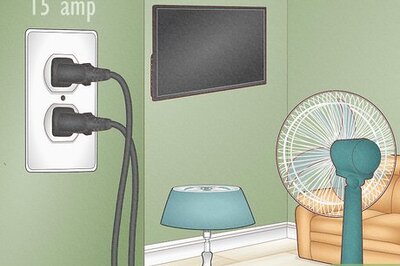
views
X
Research source
Evaluate your relationship with this person. If they seem entitled to your time, violate your boundaries, and otherwise make you feel uncomfortable, you may be their extension. You should also focus on your own feelings. If you feel drained constantly, and don't have time for yourself, you may be a narcissistic extension.
Evaluating Your Relationship

Think about whether this person is entitled. If you are a narcissistic extension, the narcissist will not think of you as a separate person. Therefore, they will feel entitled to your time and attention. They will not consider whether or not you have time to engage with them. They will just assume they deserve your energy. A narcissist will expect from you whatever they expect or want for themselves. They will assume your needs and wants are the same as theirs, and therefore be very demanding of your attention. For example, if you're in a relationship with a narcissist, they may assume you're going out or staying in on any given night to suit their needs. They will become angry and even hostile if you express your need for alone time or socialization independent of them. They may be unable to understand that they do not deserve your constant attention.

Watch for boundary violations. If you're a narcissistic extension, a narcissist sees you as an extension of themselves. Therefore, boundaries are non-existent in your relationship. A narcissist will not realize when you're becoming nervous or uncomfortable, and will continually push your boundaries in order to get you to serve their own needs. For example, your girlfriend wants to take you hiking near the mountains, even though you've told her many times you're afraid of heights. She does not let it go until you agree to go with her. During the hike, you becoming increasingly panicked and uncomfortable as you get higher in the mountains. Your girlfriend does not seem concerned about your requests to stop. Instead, she is angry that you are not keeping up with her. She is not concerned you're uncomfortable and cannot fathom your feelings about the situation are different than her's.

Evaluate your conversations. Conversations with a narcissist can be very frustrating. A narcissist has very little sense of shame. As a narcissistic extension, you're expected to build up a narcissist even when conversations make you uncomfortable. You are also expected to give out a lot of information about yourself, whether you want to or not. A narcissist may share facts about themselves that feel too private and personal, and have little sense of shame when sharing. A narcissist may, for example, tell a story about how they "called someone out" and boast about having been very rude and aggressive to someone. They will expect you to be impressed by their courage in this situation, rather than shocked by the hostility. A narcissist will expect this same level of transparency from you, and be unable to tell when you're uncomfortable in a situation. They may, for example, ask very pressing questions and get angry if you don't disclose information. They also will be unable to tell when you're becoming uncomfortable in a situation.

Think about whether they take credit for your accomplishments. If you're a narcissistic extension, the narcissist sees you as a reflection of them and how people view them. Therefore, they will take credit for your accomplishments and do the reverse by blaming you for times you don't meet their standards. A narcissist may, for example, say something like, "I got you a really good grade on that test because I studied with you" or "That publication was because I reviewed your work." But if your test did not get the grade they wanted, the narcissistic parent who had previously taken credit for your good grade will suddenly blame you for making them look bad. This trait is particularly common if your parent is a narcissist and you are their extension.

Watch for angry, dismissive behavior. Narcissists do not like it when their behavior is questioned. If they are questioned in any way, it's common for them to become hostile and angry very suddenly. Think about any time you've pushed back against a narcissist. When you tell this person they hurt you, how do they react? Instead of admitting to wrongdoing or agreeing to change, a narcissist will often get very angry. They may meet your request with personal attacks and put downs, and may even force you to apologize. If you're a narcissistic extension, the narcissist will feel your feelings and emotions should only exist to serve them. They will be unable to understand when your feelings are hurt, and be unwilling to change for your sake. Since the narcissist won't listen to you, try journaling the various incidents that occur.
Considering Your Feelings

Consider whether the person understands your needs and feelings. In any relationship, it's important your wants and needs are met to some degree. When you're a narcissistic extension, however, your wants and needs will consistently fall to the wayside. Think about what you need and want and whether it's consistently sacrificed. Do you feel like the other person is willing or able to meet certain needs, or allow you to pursue your own interests? A narcissist will only be able to see their needs and wants, and often expect them to be met even if it's unreasonable or interferes with your own needs and wants. They are good at manipulating others, so if you confront them with your feelings, they're likely to get hostile instead of apologizing and changing. For example, you're extroverted by nature and like to go out on the weekends. Your boyfriend gets nervous at big parties, and expects you to stay by his side the whole time, even when he refuses to socialize with others. When you express the fact your need for socialization isn't met, he insists you instead meet his need for attention and reassurance. Rather than working towards a compromise, a narcissistic boyfriend will instead continue to put his needs first, regardless of whether it's reasonable.

Evaluate how much time you have for yourself. Being a narcissistic extension is draining. If you're in a relationship with a narcissist, they will take up a lot of your time and energy. Consider whether you have time for yourself. Are you allowed to pursue your own hobbies and interests? Do you have separate relationships with family members and friends? If not, you may be a narcissistic extension.

Think about whether this person is the focus of your energy. A narcissist will not see you as a separate entity, with your own ideas and opinions. They will only see you as a reflection of them and their values. Therefore, you will not have a lot of energy to focus on anything but them. A narcissist will constantly pressure you to make them happy and content. You will find yourself trying to meet unreasonable needs a lot, and many of your daily decisions will revolve around keeping the narcissist happy. If you consider your own feelings, you may feel guilt and shame. Narcissists are very good at guilt-tripping, and you may feel like a bad person if you take time for yourself on occasion.

Consider if you're allowed to experience and define your own feelings. For narcissists, feelings are a competition. If you experience an emotion, it must be filtered through the narcissist. You may eventually start to feel you don't have permission to have certain feelings or emotions. Narcissists like to control everything, including your feelings. They tend to take pleasure over making another person feel shame. You may eventually internalize the narcissist's put downs, and begin to feel shame over your basic wants and needs. You may also be unable to express hurt. If you say something like, "The way you were behaving last night hurt my feelings," the narcissist will not apologize. Instead, they will chastise you for having felt that way or insist your feelings are invalid.
Distancing Yourself from a Narcissist

Avoid being sucked back into the relationship. Narcissists don't let their extensions go easily. If you're trying to distance yourself from a narcissist, they will manipulate you to get you to stay. Avoid getting sucked back into this cycle. Stay strong as you end a relationship with a narcissist. A narcissist often feigns the desire to change when they sense someone is leaving. They may tell you things will be different this time, and make big promises for major changes. Remember, a narcissist only acts to serve their own needs. They are only making you promises in the hopes of getting something they want. In this case, they want your attention and focus. Do not believe anything a narcissist says as you prepare to leave.

Release your anger. It's natural to feel angry after leaving a narcissist. You expected someone to be kind and loving, and instead they neglected your needs and wants. Anger is an important step in the healing process. Realize that you are angry. Think about the actions and behaviors that created this sense of anger. From there, find ways to release your anger in a healthy fashion. You can cry, talk to a friend, actively journal about it, or engage in physical activity.

See a therapist. It's important to talk things over with a therapist. You do not want relationship patterns to repeat in the future. You also want to make sure you're dealing with your emotions in a healthy fashion. You need to remember how to meet your own personal needs. After being a narcissistic extension, especially if you were one for a long time, you may not remember what you need and want out of life. A neutral third party can help you remember. You can see a therapist through your regular doctor or through your insurance. If you're a student, your college or university may provide free counseling.

Cease contact, if necessary. Narcissists may not let their extensions go easily. You may need to cease contact with a narcissist to avoid getting dragged back into the cycle. Block them on social media. You should also block their phone number and email address. If you were in an abusive relationship, contact a local domestic violence shelter for help. You should also call 9-1-1 or your local emergency contact number if you feel your safety is immediately threatened at any point.
















Comments
0 comment